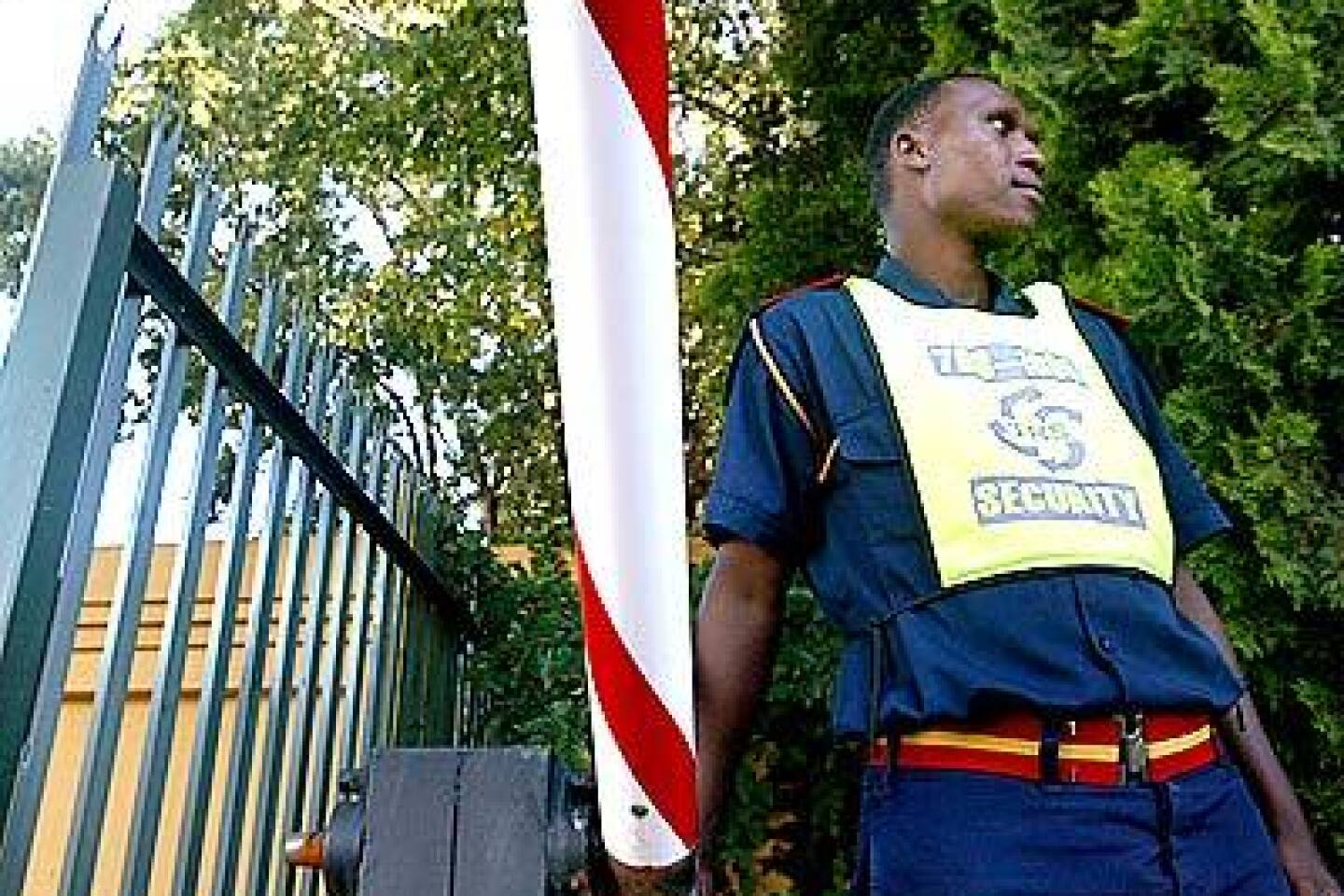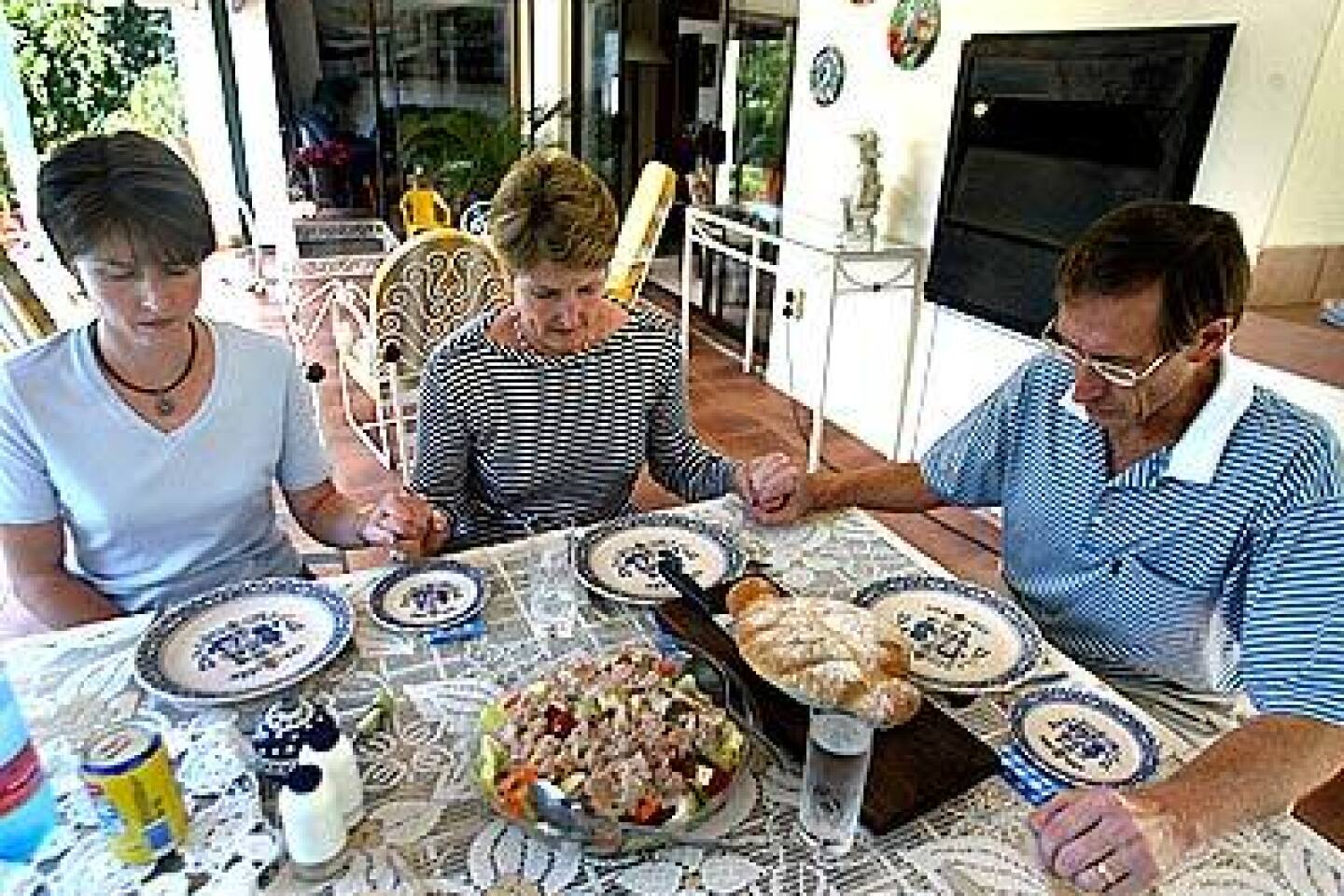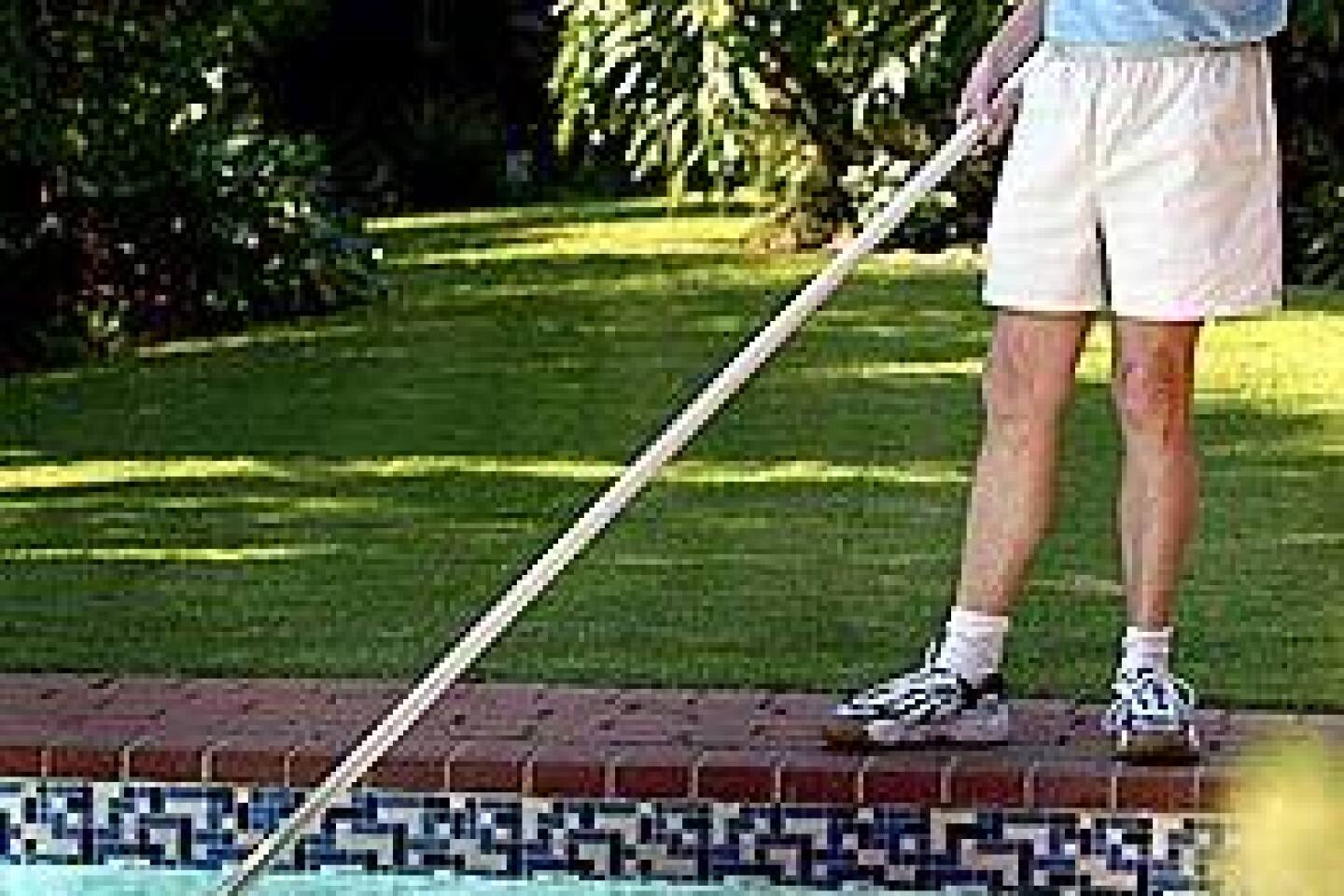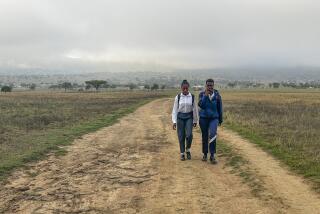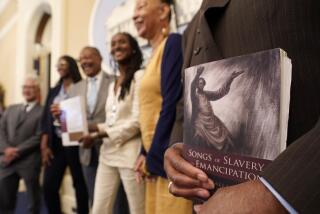From the Archives: White couple backs reforms from behind an electric fence
Of all the signs of the new era dawning in South Africa, one of the more eloquent is attached to the 8,000-volt wire fence that rings Willie and Celeste van der Merwe’s four-bedroom home, swimming pool, tennis court and 25 acres of fruit trees and flowers.
The sign, in Zulu, Afrikaans and English, reads: “Noosi. Gevaar. Danger.”
The fence keeps the dogs in and the troublemakers out. It wouldn’t kill anyone, though it would deliver a painful jolt. But that’s enough for Celeste van der Merwe. “It makes us feel a bit safer, you know,” Celeste said.
The Van der Merwes (pronounced fan-duh-MERV-ah) are part of a privileged species in this country: white, Afrikaner, mid-40s, high income, health club membership, two cars, plenty of land, housekeeper, gardener, two daughters in college and a third just graduated.
In any other society in the world, that would give them high hopes for a comfortable, prosperous future. But not in South Africa in 1992. On that well-tended landscape behind the $5,000 fence are some mightily worried people.
Like so many of the 5 million privileged whites, the Van der Merwes are kind, friendly, intelligent, Christian folks who support apartheid reform--but dread the day that their 29 million black compatriots get control of the levers of government.
They already see trouble brewing everywhere. Crime is soaring; the morning newspapers serve up a daily feast of brutal attacks on whites by black thieves who never seem to get caught. Massive black squatter settlements seem to appear overnight on the veld, inching ever closer to the deeded homes and land whites hold dear.
And more trouble is on the horizon. Millions of poorly educated blacks--a result, many whites admit, of apartheid--hope to use their new voting power to grab back what apartheid has stolen.
As a collective whole, whites know they owe blacks for the oppression and discrimination that have left so many penniless and jobless. Everyone agrees blacks deserve a bigger piece of the pie.
But, as individuals, whites don’t believe they should have to give up their homes and cars and dining room suites to the black housekeeper living in the one-room “servants’ quarters” in their flowering gardens.
The Van der Merwes worked hard for their success and believe they deserve it.
They bought their 25 acres of South Africa from Willie’s father 22 years ago, when it was a wild, scrubby rural tract with a small cottage. It fulfilled their dream to own a “smallholding,” as it’s called in South Africa, far from the noise and smog of Johannesburg, now a growing metropolis of 3.5 million people, including Soweto, 20 miles away.
Willie and Celeste poured their savings and vacation days into the smallholding. Willie slashed back the brush and planted peach, plum, apricot and fig trees. They built a large new house, put in the swimming pool and, later, the tennis court.
A visitor to the Van der Merwe home finds them in the traditional weekend attire of white South Africans--Celeste in dressy slacks, blouse and jewelry and her husband, barefoot, in jogging shorts and T-shirt. China cups of tea and pieces of cake from their oldest daughter’s recent wedding are served as the sun sets on another picture-perfect day in Africa.
Theirs has been a happy life.
Willie’s job as the financial manager of a livestock auction firm allowed Celeste to stay home to raise the children. She ferried the girls to years of afternoon tennis, ballet and piano lessons as well as private elocution classes to remove the rough Afrikaans accent from their English.
Every Sunday, the family has slid into the pews of a nearby Dutch Reformed Church, a repository of Afrikaner culture and tradition. Celeste also attends a weekly Bible study and joins other white homemakers in a sewing class.
The more comfortable they become, though, the more they worry about the direction their country is heading.
To them, Nelson Mandela, the most powerful black leader in the country, seems to be speaking out of both sides of his mouth. He raises black hopes by promising to nationalize key industries and restore to blacks the land that is rightfully theirs. But he also tries to reassure whites that their property, savings accounts and jobs will be safe under a black government.
“A lot of blacks think that we whites owe them something and that we’ve got to give it to them or they’ll just take it,” said Celeste, a slender 44-year-old who imagines the worst. Like many whites, she believes that most blacks “don’t realize that we’ve worked for what we’ve achieved.”
Now that their daughters have left home, Celeste has grown even more worried.
“What’s going to happen,” Celeste asked Willie the other day, “if they decide, OK, it’s only the two of us living in this house now and we don’t need it? What’s going to stop a black government from taking it from us?”
Her husband, a tall, blade-thin man of 46, looked around his tastefully decorated living room.
“There’s space in this house for 20 people,” he admitted. But he said he was counting on the “good sense” of black leaders. “If the government of the day was to allow something like that, this whole country would be rack and ruin in six months’ time,” he said.
That is no idle fear. Five million blacks are homeless in South Africa, and the demand for land to hold them is building.
Only a few months ago, a white suburb threw up a 24-hour blockade to prevent Randburg city officials from moving 6,000 black squatters next door. The city eventually promised to look elsewhere. But that squatter community is just seven miles from the Van der Merwes’ front gate.
With the growing problems of joblessness and homelessness comes crime.
Two houses down the road from the Van der Merwes, three black men broke in on a family eating dinner last year, killing a young white woman and severely beating her mother. The intruders escaped in the daughter’s BMW with a television set and 200 rand (about $80) in cash.
“That is why we whites have a fear of blacks,” Celeste said, reflecting a view held by most of her neighbors. “They’ve got no regard for human life. I don’t think life is as important to them as it is to us.
“I can’t imagine them governing this country,” Celeste added. “But it’s a new South Africa. We’ve got to accept it. And it’s the right thing to do.”
Just a month ago, the Van der Merwes and their daughters were among the 70% of whites who voted “yes” to end apartheid and negotiate the future with blacks. But for them, and for most whites, that vote was no road-to-Damascus conversion or even an endorsement of black-majority government. It was the reluctant mandate of an electorate with no options left.
Whites’ attempt to maintain political power, first by suppressing the black majority and later by sweeping it into autonomous ethnic “homelands,” had reached a dead end.
They could either try it all again, inviting the certain wrath of the world, or barter their power, privilege and maybe even their wealth for protection from the rising demands of that sea of black faces.
Had the Van der Merwes been born with black skin, in this country that reserved 87% of the land for a white minority, life would have been very different for them. But they don’t give much thought to such hypothetical questions.
Willie van der Merwe traces his claim to the land to his Dutch ancestors, the Afrikaners, the first whites to arrive on the southern tip of Africa three centuries ago. As the years passed, the Dutch-, German- and French-born settlers shared a language, Afrikaans, a strict Calvinist religion and hatred for the British colonizers.
In the 1830s, a band of Afrikaners, among them many Van der Merwe clans, set out on a great wagon train trek into the South African heartland in search of religious and political independence from Britain. They fought the British and, later, the black African tribes, until the Afrikaners controlled vast tracts of South Africa’s interior, including what is now Johannesburg.
“Our forefathers fought for this property, just as the Americans fought their Indians,” Willie van der Merwe said. “And it legally belongs to us.
“You have rich and poor people in America, and they have rich and poor people in England,” he added. “But here in South Africa everybody thinks we must redistribute the wealth among the people. Nowhere else in the world are those demands made.”
Afrikaners account for about half of all whites in South Africa, and the Boer traditions live on in the Van der Merwe household. Although the family speaks flawless English, their home language is Afrikaans. And they consider themselves culturally distinct from non-Afrikaner whites.
“If I could choose husbands for my daughters, I’d prefer they marry Afrikaners rather than English boys,” Celeste said. “You can’t bring children up in a split home like that.”
Many English-speaking whites also hold passports from European countries and, if the going gets tough in South Africa, they can emigrate. The Afrikaner, though, is here to stay.
Like those of most whites, the Van der Merwes’ opinions of blacks have been shaped largely by the day-to-day contact with their black employees. Their housekeeper and gardener live behind the Van der Merwe house, in rooms about the size of their front porch.
Celeste van der Merwe has spent hours urging her “house girl,” a single mother of three in her 30s, to use birth control and protect herself against AIDS.
“They complain about all these children they have to support, and I tell them we would have liked to have more children ourselves, but we knew we wouldn’t be able to afford it,” Celeste said. But she said her lessons fall on deaf ears.
Adding to Celeste’s insecurity is her maid’s and gardener’s command of English, Afrikaans and an array of African languages, which she believes puts her at a disadvantage in her own house.
“Very often, I find these two talking in front of me, and I know they’re talking about me,” Celeste said. “But I can’t understand a word. And I can’t even talk on the telephone without them knowing what I’m saying.” (Celeste once took a short course in Sotho, but she didn’t learn much because the teacher was more interested in grammar than conversation.)
Zulu lessons are required at the school where the Van der Merwe’s 20-year-old daughter, Noelene, studies food preparation and clothing design. But the class focuses on commands that a white employer might need in a clothing factory, such as “Pass the scissors” and “Sew that.”
All three Van der Merwe daughters grew up in whites-only primary and high schools, and, like their parents, none has ever had a black friend.
“I think maybe if we had had blacks with us in school when we were growing up, we might have understood them better,” Noelene said. “But we don’t know them, and they don’t know us.”
More to Read
Start your day right
Sign up for Essential California for news, features and recommendations from the L.A. Times and beyond in your inbox six days a week.
You may occasionally receive promotional content from the Los Angeles Times.
